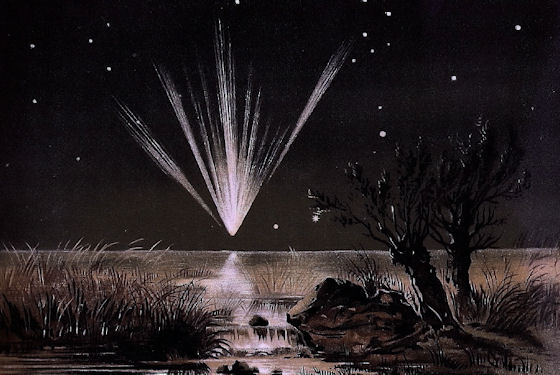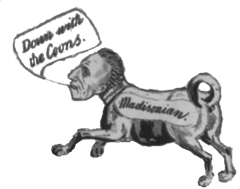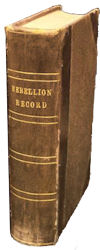—Lieutenant-Colonel J. W. Ripley, head of the Ordnance Department, received the brevet of Brigadier-General in the United States Army. A well-merited honor. He is one of the oldest and most valuable officers of the army. He was abroad on leave at the commencement of the rebellion, but hastened home to offer his services. On being asked by a friend if he had returned to engage in the war, he replied: ” Yes, and to give my last drop of blood to defend my Government.” He has disowned his nephew, Major Ripley, who took part in the attack on Fort Sumter.
Captain (now Major) Doubleday of the First Artillery, recently promoted to be a Major in the Seventeenth foot, received his new commission.—Baltimore American, July 5.
—The Mozart Regiment, N. Y. Volunteers, embarked this morning, at Yonkers, and left for Elizabethport, N. J., to take the cars for Washington. The regiment numbered 1,046, and were armed with Enfield muskets. They had two hundred common tents, forty officers’ tents, ten baggage wagons, each drawn by six horses, four hospital ambulances, twenty camp stoves, and two brass 12-pound howitzers.— N. Y. World, July 6.
—A Union meeting was held at the city of Louisiana, Missouri, at which Mr. Charles D. Drake delivered an elaborate speech in defence of the Union and the Constitution.—(Doc. 63.)
—Pursuant to the call of the President of the United States, Congress assembled at Washington this day in special session. Galusha A. Grow, of Penn., was elected speaker of the House, and took the oath of office, which was administered by Mr. Washburne of Illinois. The President’s message was received and read together with reports of the heads of the various departments. The message is brief, and the facts it states are well known; the important points of the document are those which embody the recommendations of the President in relation to the measures to be adopted for the prosecution of the war. Compromise by Congress ho regards as out of the question. The people only can compromise on a question which affects the existence of the nation. He therefore asks that Congress give to the Executive the “legal means to make the contest a short and decisive one, by placing at the control of Government for the work at least four hundred thousand men and four hundred millions of dollars.” That number of men, he says, are ready and willing to take arms for the support of the Government, whilst the amount asked for war purposes is quite within the ability of the country to supply.—(Doc. 65, 66, 67, 68.)
—A Small flag of the Southern Confederacy was raised over a house on an alley in the upper part of the city of Louisville, Ky., to-day. The perpetration of such a deed on such a day is almost sacrilegious. The miserable flag’s time was short. Some patriotic Germans took it down, and bore it away, and burned it. Its ashes are a part of the mud of the streets.— Louisville Journal, July 8.
—The passenger trains on the Louisville and Nashville railroad were seized this morning at Camp Ironsdale, near Mitchellsville, by order of Major-General Anderson, and carried to Nashville, Tenn. The managers had taken all the engines and running stock to Louisville. Ky., against which policy Tennessee had remonstrated, and this seizure was a necessity as a measure of protection. Major-General Anderson informed the agent of the road that no further seizures would be made, and that trains should pass uninterrupted.—Louisville Journal, July 5.
A skirmish took place at Harper’s Ferry, Va., this evening between companies of the New York Ninth Regiment and a detachment of Confederates, who had returned to Harper’s Ferry. A number of men belonging to one of the companies of the New York Ninth crossed over to the Ferry, for the purpose of seeing the work of destruction which had been perpetrated by the rebels, when they were fired upon by a party of men from Bolivar heights. They immediately crossed the river, returned to their encampment, and being reinforced, proceeded at once to the Potomac, opposite Harper’s Ferry, and opened fire upon them. The rebels, concealing themselves in the houses and behind the abutments of the burned bridge, had a decided advantage, and from their position poured a galling fire upon the Federal companies on this side, which were perfectly exposed: yet they stood their ground with almost reckless bravery, until the firing ceased from the opposite side, when they retired with a loss of two killed and three wounded. Several of the rebels were killed, one was killed by a citizen of Harper’s Ferry, who engaged in the fight, he being driven from the place by the rebels.—Baltimore American, July 8.
—The rebels erected a battery, and mounted two rifled cannon at Matthias Point, Va. —N. Y. Times, July C.
—The New Hampshire Legislature adjourned to-day, after a session of thirty days. Resolutions were reported, declaring the war now in progress a war solely for the maintenance of the Government and the suppression of rebellion; declaring against the right of secession; asserting that neither the President nor Congress can constitutionally entertain any proposition which has for its object the dismemberment of the Government or the dissolution of the Union; and finally declaring that the State of New Hampshire pledges her resources for the integrity of the Union, the support of the Constitution, and the enforcement of the laws of the General Government. When these resolutions were put to the vote the members all rose and gave a unanimous aye. Not a member voted in the negative. A militia bill was passed authorizing the Governor to raise three regiments, to each of which he may add a company of artillery, cavalry, and riflemen.—National Intelligencer, July 9.
—The Sixth Regiment of Massachusetts Militia, commanded by Colonel E. F. Jones, were presented with an elegant silk flag, by the loyal citizens of Baltimore, at the Relay House, where had assembled several thousand ladies and gentlemen for the purpose of witnessing the ceremonies. The regiment having been formed in a semicircle, S. J. K. Handy, Esq., advanced, and addressed the command in an eloquent and patriotic strain, presenting the flag in the name of the loyal citizens of Baltimore. Colonel Jones received the flag, and responded briefly to the address. He remarked, among other things, that ladies and gentlemen, representatives of the loyal citizens of Baltimore, had come to place the regiment under an additional obligation, in bestowing such a beautiful flag upon them. An acquaintance which opened in blood had been continued and cultivated with services of great kindness. The command appreciated the many acts which had been bestowed upon their wounded, as well as the kind expressions of the Union-loving citizens of Baltimore. The flag was accepted not only as a token of loyalty, but as an evidence of friendship, which he hoped would continue to grow and strengthen; and when it was unfurled at home, many eyes would be filled with tears in memory of those who had fallen. The presentation laid the old State of Massachusetts under an obligation to the city of Baltimore, and would ever be remembered by her best citizens. In concluding, he assured all present that the object of his regiment was not to oppress, or even to harass the South, but to protect the Capital and preserve the Government. He regretted that his language could but faintly express his feelings, but if his friends could look into his heart they would much better understand him. At the conclusion of his speech three cheers were given for Massachusetts, in response to which nine cheers were given by the regiment for teo loyal citizens of Baltimore. Baltimore American.
—A Correspondent of the Charleston Courier:—”There are some who affect to believe that we shall have a peace before we have a fight. The reaction so long predicted al the North having begun, the circulating petitions of merchants, bankers, clergymen, and other citizens of New York, which are pressing their peaceful influences upon Abraham Lincoln, are also operating here. The question is already being discussed in its various bearings, and the auspicious event has even been assigned a place this side of Christmas.
We have no idea, however, of giving up the contest without, at least, one grand exhibition of the power, the prowess, and the resources of the people who have been stigmatized as “the ruffian rebels of the South.” We went into the war on principle; let us come, out on principle, but not until we have left a mark upon our enemies that shall secure for us for all times to come the respect of the world. The hundred thousand men we have in the field will not be content to lay down their arms in peace, until they have struck a blow that shall quiver through the North; and unless this be done, the millions they have left behind them will have their “welcome home” alloyed by the thought that their husbands, sons, and brothers have returned without teaching that lesson of humiliation to an insolent foe, which, next to the Lord’s Prayer, has been the uppermost desire in every Southern heart.”











